Understanding Ethics and Professional Practice
VerifiedAdded on 2023/01/13
|17
|3443
|84
AI Summary
This document explores the concept of ethics and professional practice in various fields. It discusses the Facebook-Cambridge Analytica data scandal and its ethical implications. It also compares the Australian Computer Society Code of Ethics and the ACM Code of Ethics and Professional Conduct. Additionally, it critiques the ideas of Rule Deontology and Act Deontology.
Contribute Materials
Your contribution can guide someone’s learning journey. Share your
documents today.
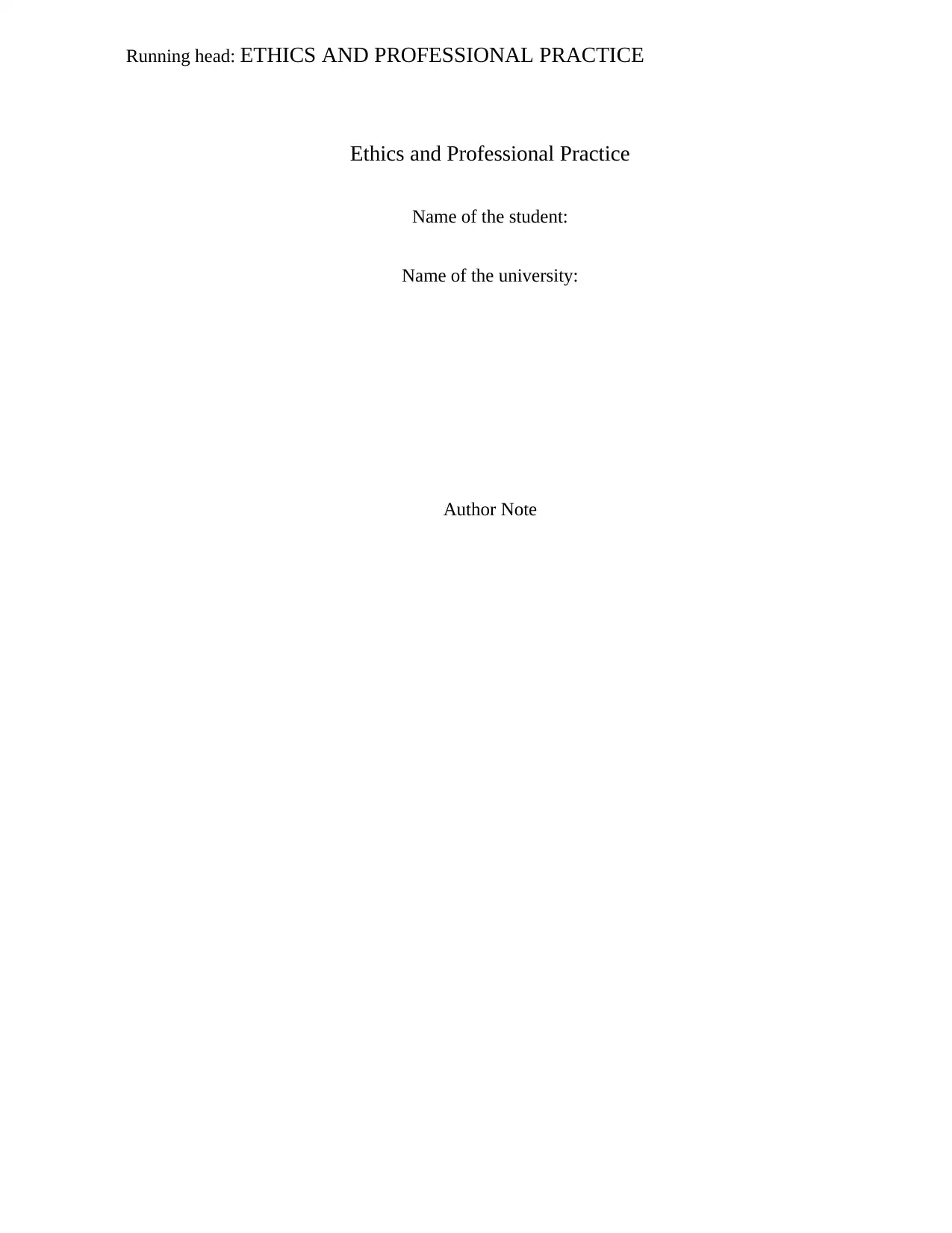
Running head: ETHICS AND PROFESSIONAL PRACTICE
Ethics and Professional Practice
Name of the student:
Name of the university:
Author Note
Ethics and Professional Practice
Name of the student:
Name of the university:
Author Note
Secure Best Marks with AI Grader
Need help grading? Try our AI Grader for instant feedback on your assignments.
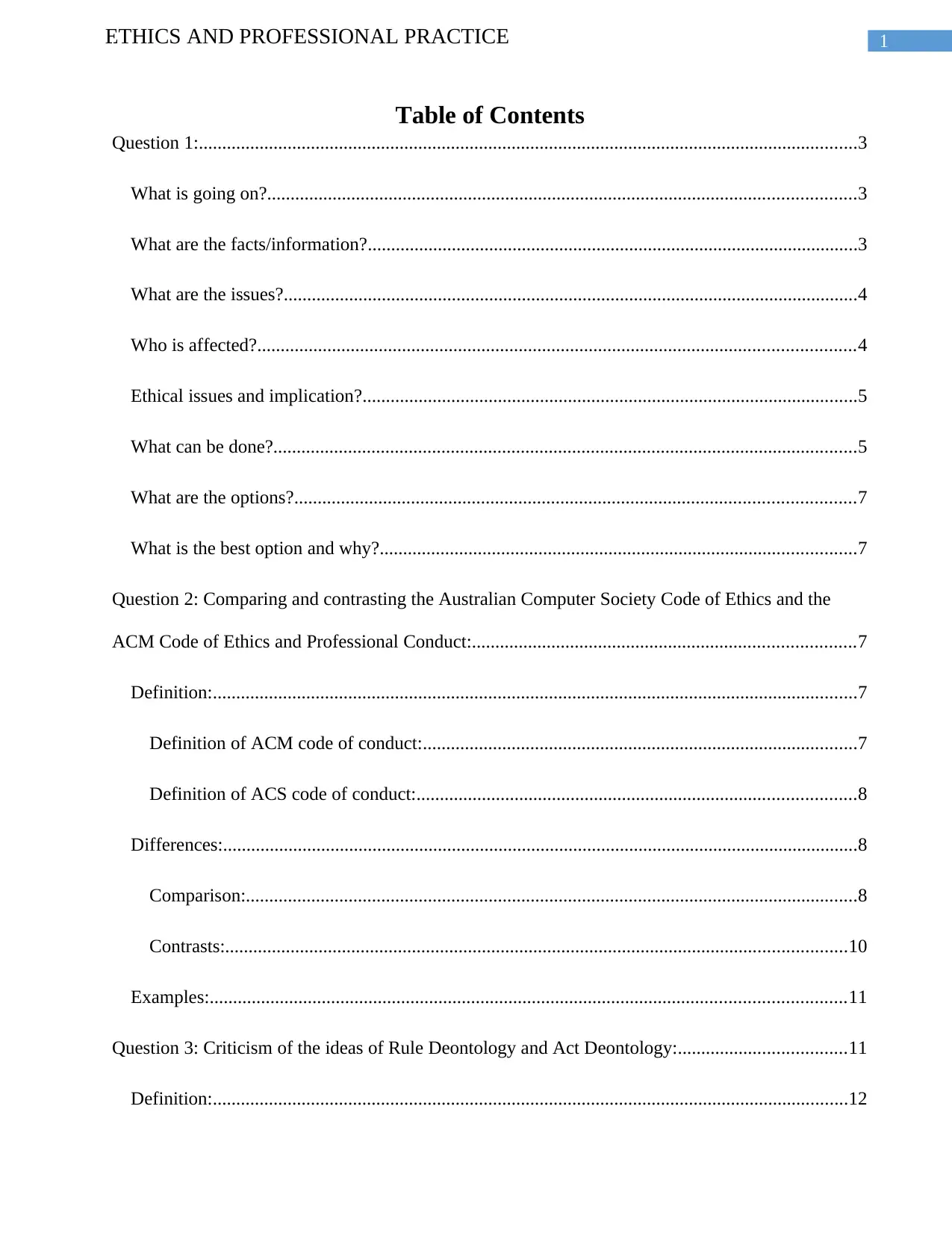
1ETHICS AND PROFESSIONAL PRACTICE
Table of Contents
Question 1:.............................................................................................................................................3
What is going on?..............................................................................................................................3
What are the facts/information?.........................................................................................................3
What are the issues?...........................................................................................................................4
Who is affected?................................................................................................................................4
Ethical issues and implication?..........................................................................................................5
What can be done?.............................................................................................................................5
What are the options?........................................................................................................................7
What is the best option and why?......................................................................................................7
Question 2: Comparing and contrasting the Australian Computer Society Code of Ethics and the
ACM Code of Ethics and Professional Conduct:..................................................................................7
Definition:..........................................................................................................................................7
Definition of ACM code of conduct:.............................................................................................7
Definition of ACS code of conduct:..............................................................................................8
Differences:........................................................................................................................................8
Comparison:...................................................................................................................................8
Contrasts:.....................................................................................................................................10
Examples:........................................................................................................................................11
Question 3: Criticism of the ideas of Rule Deontology and Act Deontology:....................................11
Definition:........................................................................................................................................12
Table of Contents
Question 1:.............................................................................................................................................3
What is going on?..............................................................................................................................3
What are the facts/information?.........................................................................................................3
What are the issues?...........................................................................................................................4
Who is affected?................................................................................................................................4
Ethical issues and implication?..........................................................................................................5
What can be done?.............................................................................................................................5
What are the options?........................................................................................................................7
What is the best option and why?......................................................................................................7
Question 2: Comparing and contrasting the Australian Computer Society Code of Ethics and the
ACM Code of Ethics and Professional Conduct:..................................................................................7
Definition:..........................................................................................................................................7
Definition of ACM code of conduct:.............................................................................................7
Definition of ACS code of conduct:..............................................................................................8
Differences:........................................................................................................................................8
Comparison:...................................................................................................................................8
Contrasts:.....................................................................................................................................10
Examples:........................................................................................................................................11
Question 3: Criticism of the ideas of Rule Deontology and Act Deontology:....................................11
Definition:........................................................................................................................................12
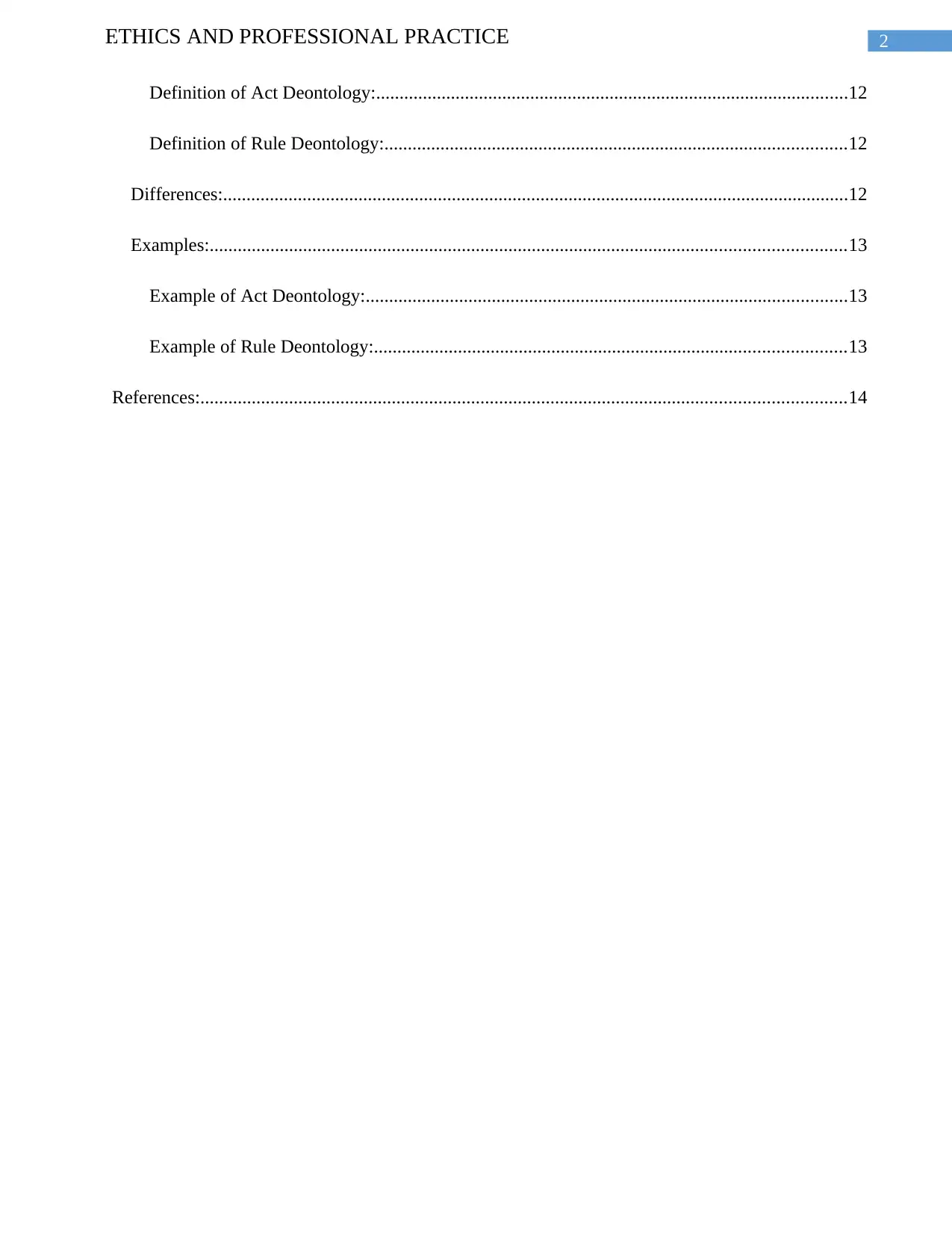
2ETHICS AND PROFESSIONAL PRACTICE
Definition of Act Deontology:.....................................................................................................12
Definition of Rule Deontology:...................................................................................................12
Differences:......................................................................................................................................12
Examples:........................................................................................................................................13
Example of Act Deontology:.......................................................................................................13
Example of Rule Deontology:.....................................................................................................13
References:..........................................................................................................................................14
Definition of Act Deontology:.....................................................................................................12
Definition of Rule Deontology:...................................................................................................12
Differences:......................................................................................................................................12
Examples:........................................................................................................................................13
Example of Act Deontology:.......................................................................................................13
Example of Rule Deontology:.....................................................................................................13
References:..........................................................................................................................................14
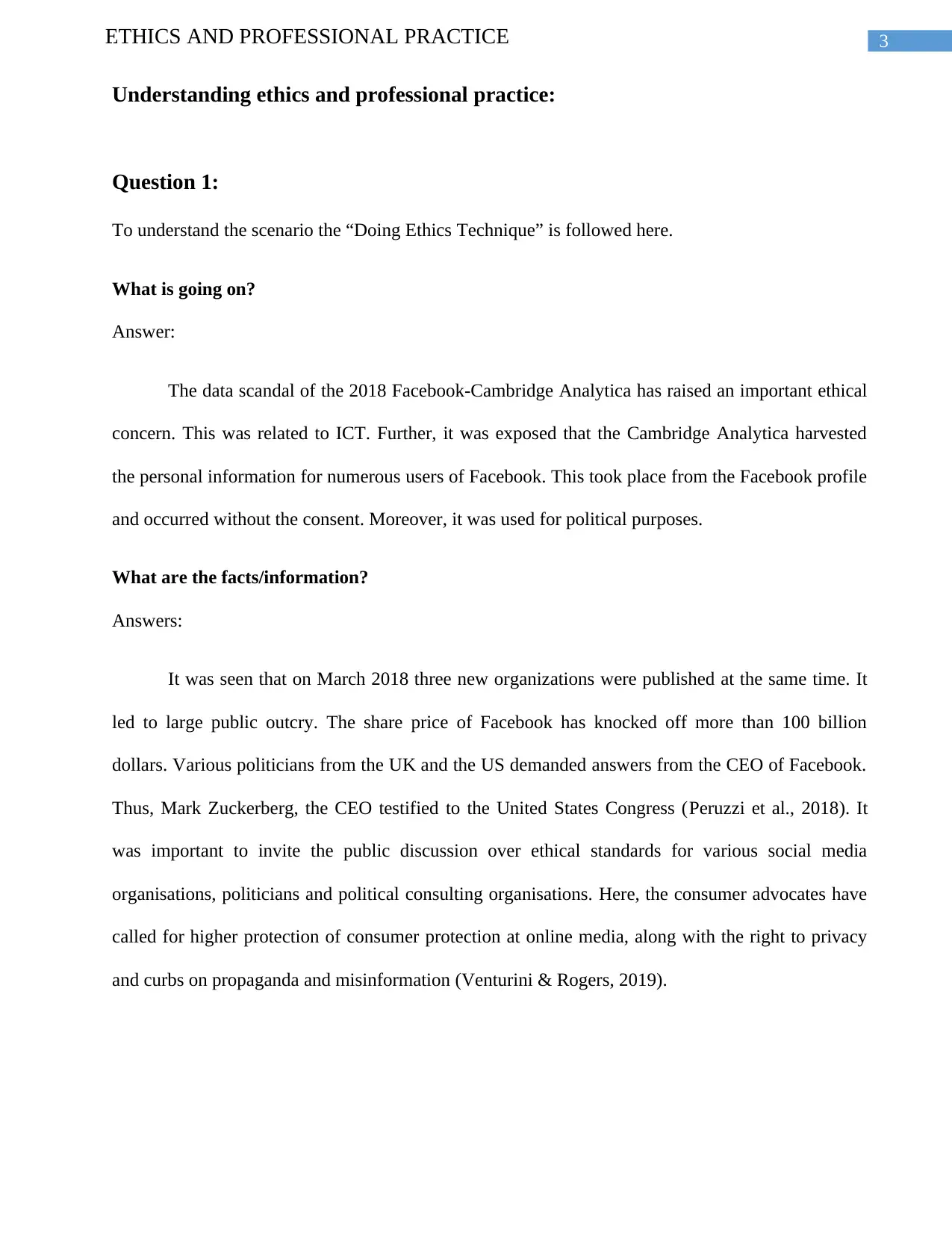
3ETHICS AND PROFESSIONAL PRACTICE
Understanding ethics and professional practice:
Question 1:
To understand the scenario the “Doing Ethics Technique” is followed here.
What is going on?
Answer:
The data scandal of the 2018 Facebook-Cambridge Analytica has raised an important ethical
concern. This was related to ICT. Further, it was exposed that the Cambridge Analytica harvested
the personal information for numerous users of Facebook. This took place from the Facebook profile
and occurred without the consent. Moreover, it was used for political purposes.
What are the facts/information?
Answers:
It was seen that on March 2018 three new organizations were published at the same time. It
led to large public outcry. The share price of Facebook has knocked off more than 100 billion
dollars. Various politicians from the UK and the US demanded answers from the CEO of Facebook.
Thus, Mark Zuckerberg, the CEO testified to the United States Congress (Peruzzi et al., 2018). It
was important to invite the public discussion over ethical standards for various social media
organisations, politicians and political consulting organisations. Here, the consumer advocates have
called for higher protection of consumer protection at online media, along with the right to privacy
and curbs on propaganda and misinformation (Venturini & Rogers, 2019).
Understanding ethics and professional practice:
Question 1:
To understand the scenario the “Doing Ethics Technique” is followed here.
What is going on?
Answer:
The data scandal of the 2018 Facebook-Cambridge Analytica has raised an important ethical
concern. This was related to ICT. Further, it was exposed that the Cambridge Analytica harvested
the personal information for numerous users of Facebook. This took place from the Facebook profile
and occurred without the consent. Moreover, it was used for political purposes.
What are the facts/information?
Answers:
It was seen that on March 2018 three new organizations were published at the same time. It
led to large public outcry. The share price of Facebook has knocked off more than 100 billion
dollars. Various politicians from the UK and the US demanded answers from the CEO of Facebook.
Thus, Mark Zuckerberg, the CEO testified to the United States Congress (Peruzzi et al., 2018). It
was important to invite the public discussion over ethical standards for various social media
organisations, politicians and political consulting organisations. Here, the consumer advocates have
called for higher protection of consumer protection at online media, along with the right to privacy
and curbs on propaganda and misinformation (Venturini & Rogers, 2019).
Secure Best Marks with AI Grader
Need help grading? Try our AI Grader for instant feedback on your assignments.
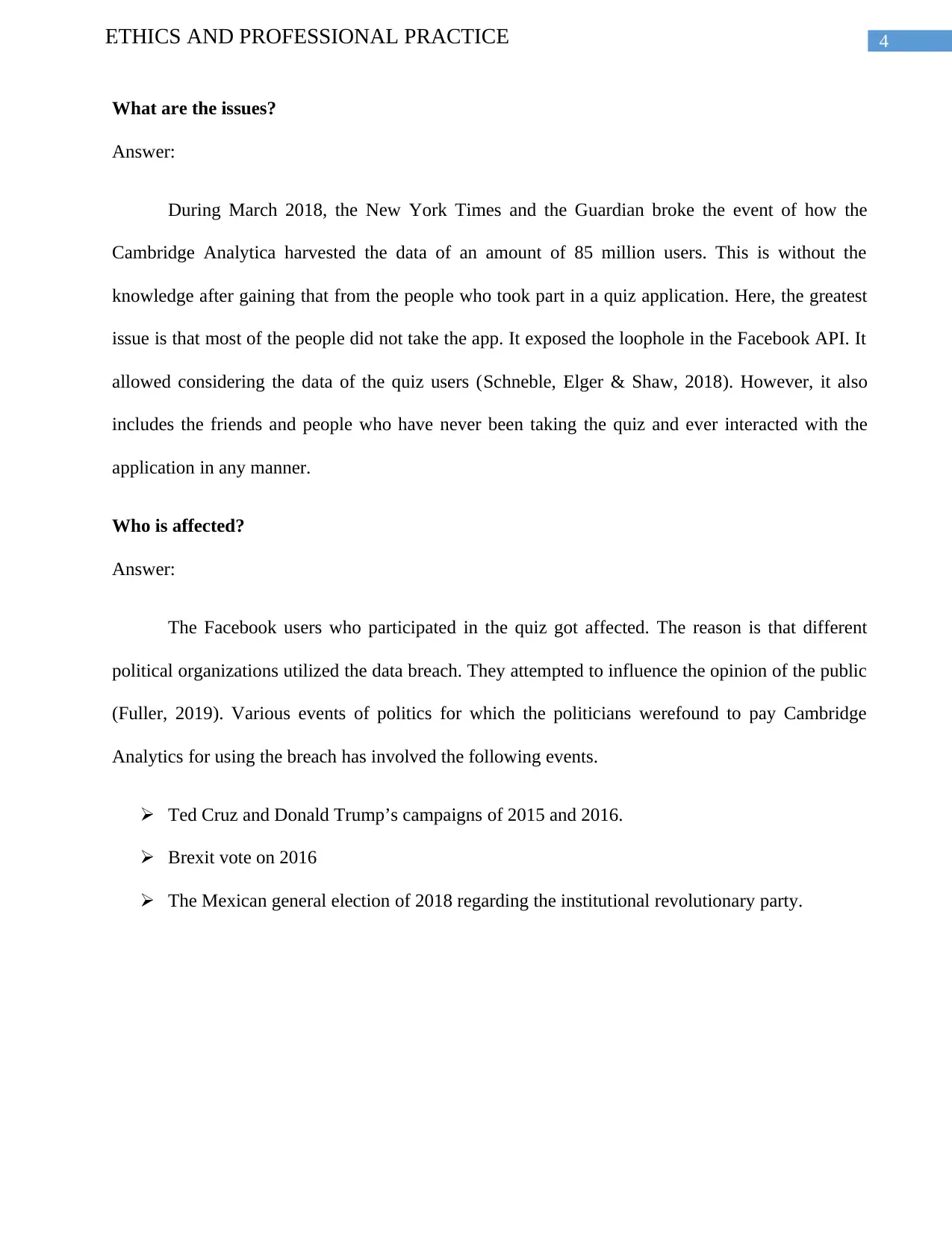
4ETHICS AND PROFESSIONAL PRACTICE
What are the issues?
Answer:
During March 2018, the New York Times and the Guardian broke the event of how the
Cambridge Analytica harvested the data of an amount of 85 million users. This is without the
knowledge after gaining that from the people who took part in a quiz application. Here, the greatest
issue is that most of the people did not take the app. It exposed the loophole in the Facebook API. It
allowed considering the data of the quiz users (Schneble, Elger & Shaw, 2018). However, it also
includes the friends and people who have never been taking the quiz and ever interacted with the
application in any manner.
Who is affected?
Answer:
The Facebook users who participated in the quiz got affected. The reason is that different
political organizations utilized the data breach. They attempted to influence the opinion of the public
(Fuller, 2019). Various events of politics for which the politicians werefound to pay Cambridge
Analytics for using the breach has involved the following events.
Ted Cruz and Donald Trump’s campaigns of 2015 and 2016.
Brexit vote on 2016
The Mexican general election of 2018 regarding the institutional revolutionary party.
What are the issues?
Answer:
During March 2018, the New York Times and the Guardian broke the event of how the
Cambridge Analytica harvested the data of an amount of 85 million users. This is without the
knowledge after gaining that from the people who took part in a quiz application. Here, the greatest
issue is that most of the people did not take the app. It exposed the loophole in the Facebook API. It
allowed considering the data of the quiz users (Schneble, Elger & Shaw, 2018). However, it also
includes the friends and people who have never been taking the quiz and ever interacted with the
application in any manner.
Who is affected?
Answer:
The Facebook users who participated in the quiz got affected. The reason is that different
political organizations utilized the data breach. They attempted to influence the opinion of the public
(Fuller, 2019). Various events of politics for which the politicians werefound to pay Cambridge
Analytics for using the breach has involved the following events.
Ted Cruz and Donald Trump’s campaigns of 2015 and 2016.
Brexit vote on 2016
The Mexican general election of 2018 regarding the institutional revolutionary party.
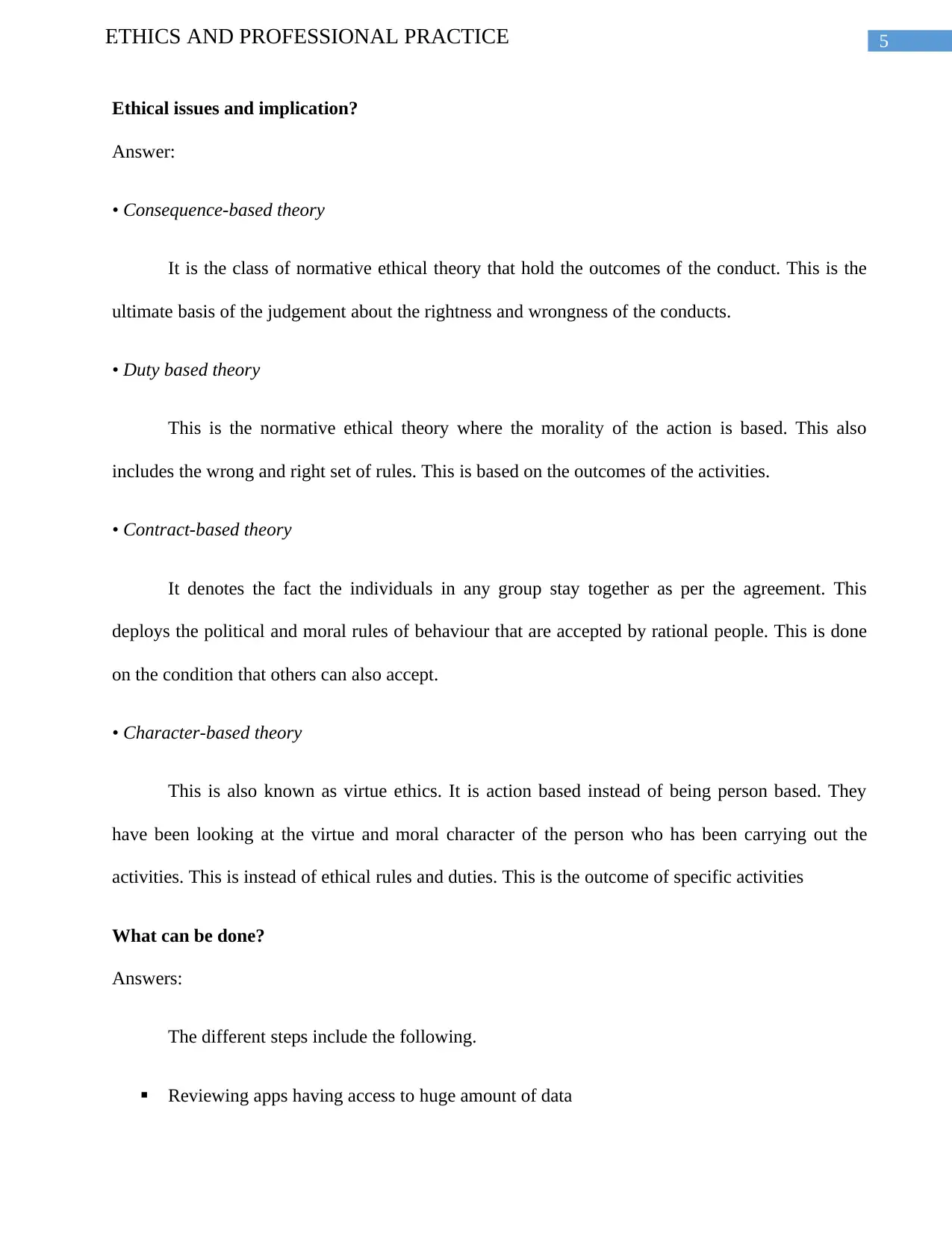
5ETHICS AND PROFESSIONAL PRACTICE
Ethical issues and implication?
Answer:
• Consequence-based theory
It is the class of normative ethical theory that hold the outcomes of the conduct. This is the
ultimate basis of the judgement about the rightness and wrongness of the conducts.
• Duty based theory
This is the normative ethical theory where the morality of the action is based. This also
includes the wrong and right set of rules. This is based on the outcomes of the activities.
• Contract-based theory
It denotes the fact the individuals in any group stay together as per the agreement. This
deploys the political and moral rules of behaviour that are accepted by rational people. This is done
on the condition that others can also accept.
• Character-based theory
This is also known as virtue ethics. It is action based instead of being person based. They
have been looking at the virtue and moral character of the person who has been carrying out the
activities. This is instead of ethical rules and duties. This is the outcome of specific activities
What can be done?
Answers:
The different steps include the following.
Reviewing apps having access to huge amount of data
Ethical issues and implication?
Answer:
• Consequence-based theory
It is the class of normative ethical theory that hold the outcomes of the conduct. This is the
ultimate basis of the judgement about the rightness and wrongness of the conducts.
• Duty based theory
This is the normative ethical theory where the morality of the action is based. This also
includes the wrong and right set of rules. This is based on the outcomes of the activities.
• Contract-based theory
It denotes the fact the individuals in any group stay together as per the agreement. This
deploys the political and moral rules of behaviour that are accepted by rational people. This is done
on the condition that others can also accept.
• Character-based theory
This is also known as virtue ethics. It is action based instead of being person based. They
have been looking at the virtue and moral character of the person who has been carrying out the
activities. This is instead of ethical rules and duties. This is the outcome of specific activities
What can be done?
Answers:
The different steps include the following.
Reviewing apps having access to huge amount of data
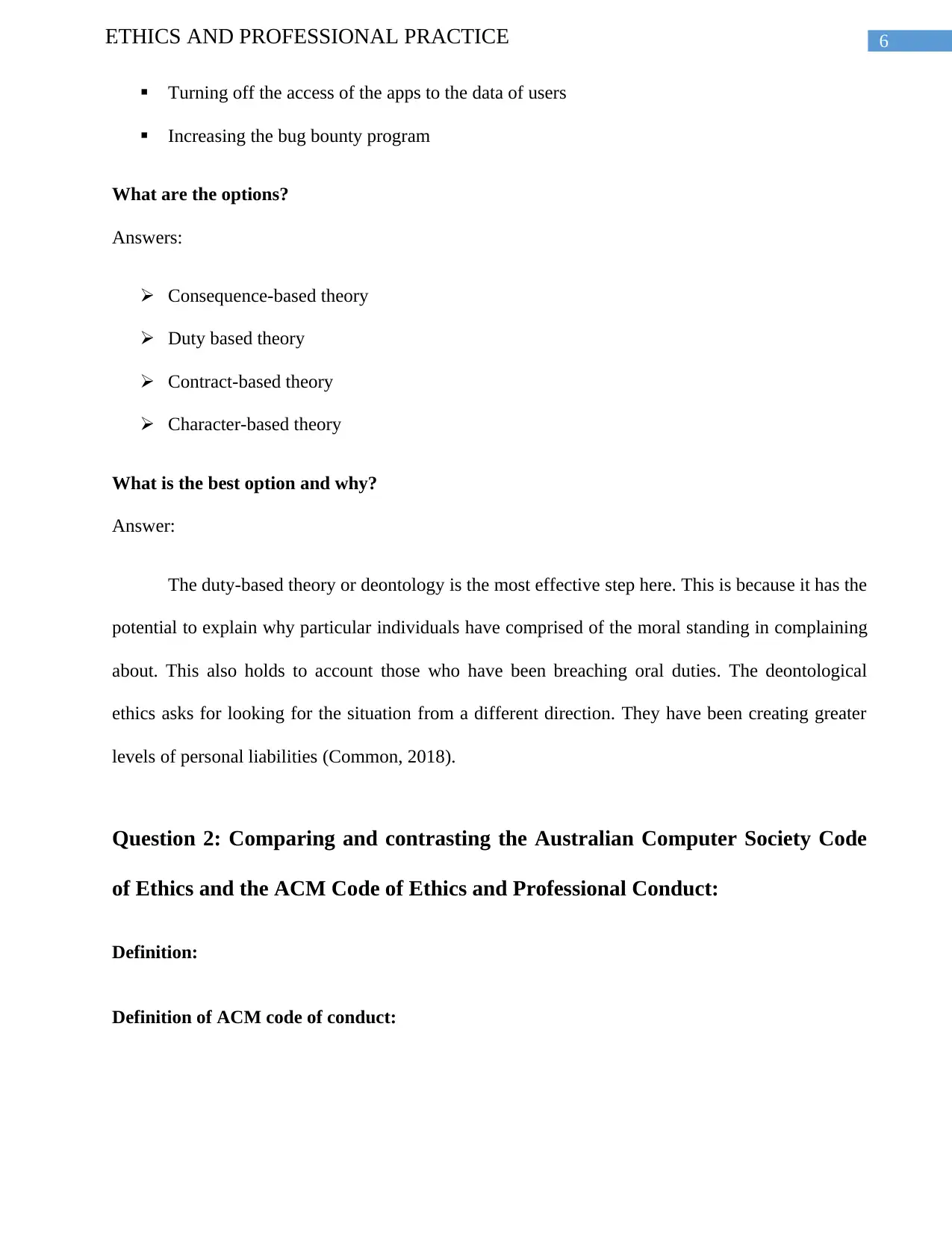
6ETHICS AND PROFESSIONAL PRACTICE
Turning off the access of the apps to the data of users
Increasing the bug bounty program
What are the options?
Answers:
Consequence-based theory
Duty based theory
Contract-based theory
Character-based theory
What is the best option and why?
Answer:
The duty-based theory or deontology is the most effective step here. This is because it has the
potential to explain why particular individuals have comprised of the moral standing in complaining
about. This also holds to account those who have been breaching oral duties. The deontological
ethics asks for looking for the situation from a different direction. They have been creating greater
levels of personal liabilities (Common, 2018).
Question 2: Comparing and contrasting the Australian Computer Society Code
of Ethics and the ACM Code of Ethics and Professional Conduct:
Definition:
Definition of ACM code of conduct:
Turning off the access of the apps to the data of users
Increasing the bug bounty program
What are the options?
Answers:
Consequence-based theory
Duty based theory
Contract-based theory
Character-based theory
What is the best option and why?
Answer:
The duty-based theory or deontology is the most effective step here. This is because it has the
potential to explain why particular individuals have comprised of the moral standing in complaining
about. This also holds to account those who have been breaching oral duties. The deontological
ethics asks for looking for the situation from a different direction. They have been creating greater
levels of personal liabilities (Common, 2018).
Question 2: Comparing and contrasting the Australian Computer Society Code
of Ethics and the ACM Code of Ethics and Professional Conduct:
Definition:
Definition of ACM code of conduct:
Paraphrase This Document
Need a fresh take? Get an instant paraphrase of this document with our AI Paraphraser
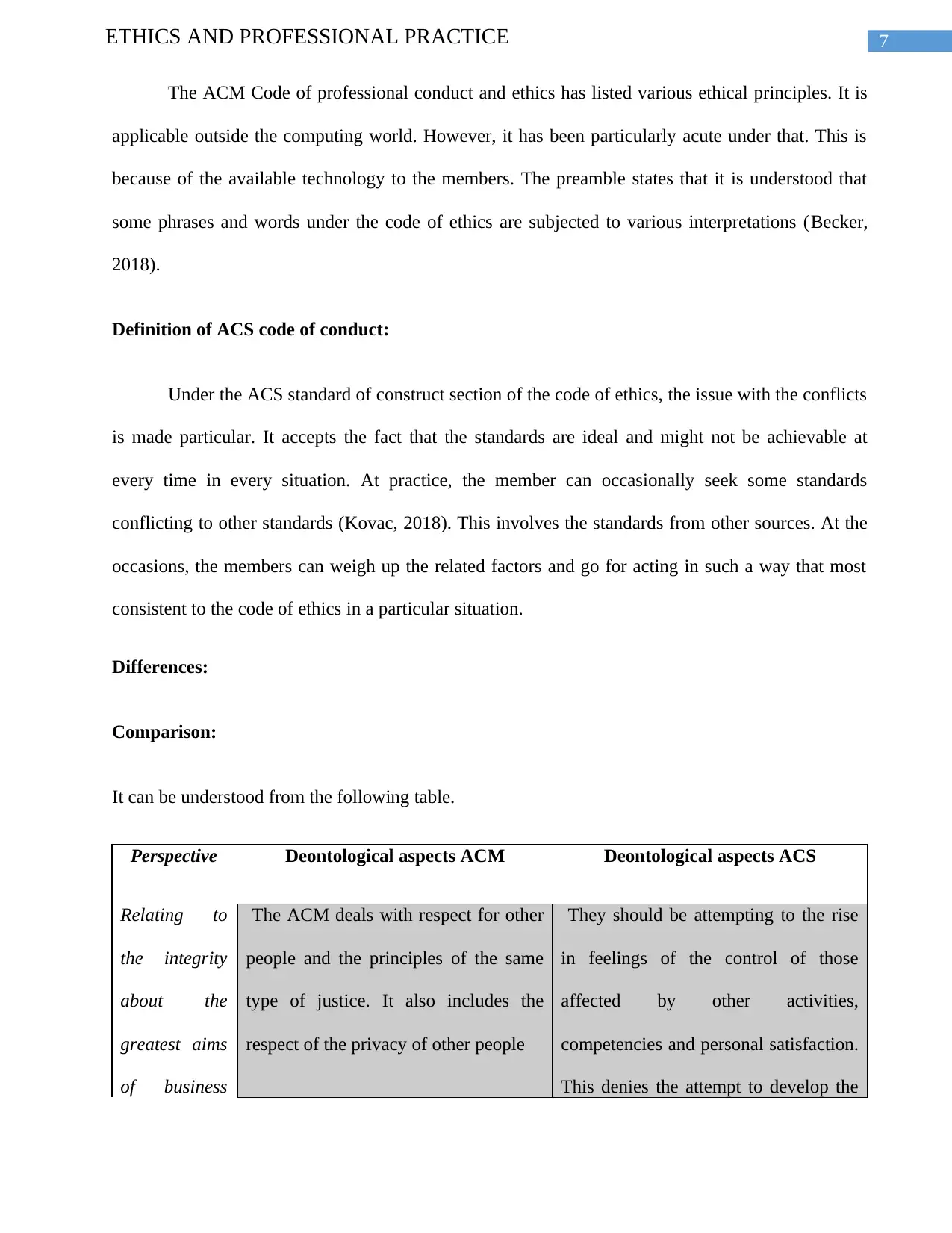
7ETHICS AND PROFESSIONAL PRACTICE
The ACM Code of professional conduct and ethics has listed various ethical principles. It is
applicable outside the computing world. However, it has been particularly acute under that. This is
because of the available technology to the members. The preamble states that it is understood that
some phrases and words under the code of ethics are subjected to various interpretations (Becker,
2018).
Definition of ACS code of conduct:
Under the ACS standard of construct section of the code of ethics, the issue with the conflicts
is made particular. It accepts the fact that the standards are ideal and might not be achievable at
every time in every situation. At practice, the member can occasionally seek some standards
conflicting to other standards (Kovac, 2018). This involves the standards from other sources. At the
occasions, the members can weigh up the related factors and go for acting in such a way that most
consistent to the code of ethics in a particular situation.
Differences:
Comparison:
It can be understood from the following table.
Perspective Deontological aspects ACM Deontological aspects ACS
Relating to
the integrity
about the
greatest aims
of business
The ACM deals with respect for other
people and the principles of the same
type of justice. It also includes the
respect of the privacy of other people
They should be attempting to the rise
in feelings of the control of those
affected by other activities,
competencies and personal satisfaction.
This denies the attempt to develop the
The ACM Code of professional conduct and ethics has listed various ethical principles. It is
applicable outside the computing world. However, it has been particularly acute under that. This is
because of the available technology to the members. The preamble states that it is understood that
some phrases and words under the code of ethics are subjected to various interpretations (Becker,
2018).
Definition of ACS code of conduct:
Under the ACS standard of construct section of the code of ethics, the issue with the conflicts
is made particular. It accepts the fact that the standards are ideal and might not be achievable at
every time in every situation. At practice, the member can occasionally seek some standards
conflicting to other standards (Kovac, 2018). This involves the standards from other sources. At the
occasions, the members can weigh up the related factors and go for acting in such a way that most
consistent to the code of ethics in a particular situation.
Differences:
Comparison:
It can be understood from the following table.
Perspective Deontological aspects ACM Deontological aspects ACS
Relating to
the integrity
about the
greatest aims
of business
The ACM deals with respect for other
people and the principles of the same
type of justice. It also includes the
respect of the privacy of other people
They should be attempting to the rise
in feelings of the control of those
affected by other activities,
competencies and personal satisfaction.
This denies the attempt to develop the
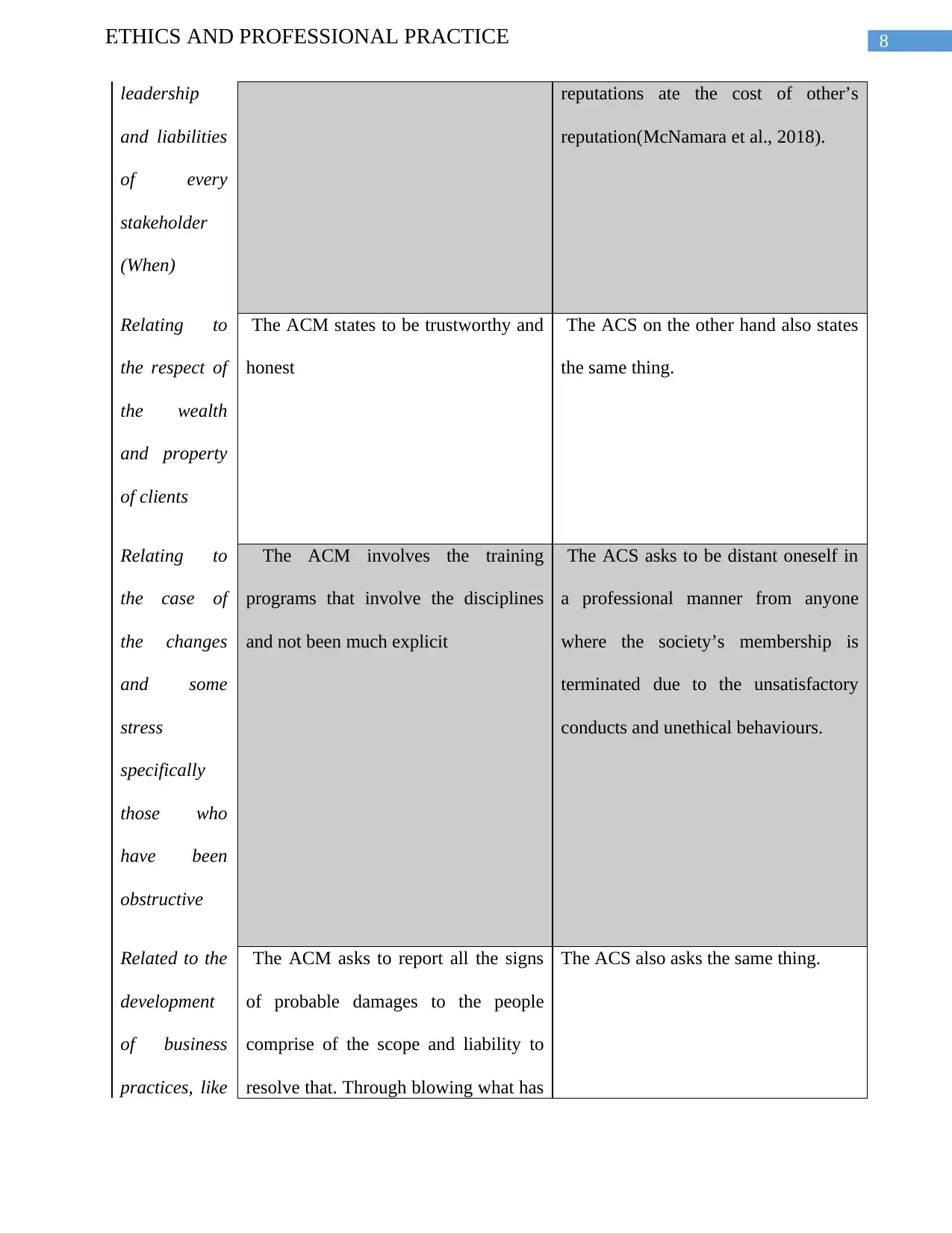
8ETHICS AND PROFESSIONAL PRACTICE
leadership
and liabilities
of every
stakeholder
(When)
reputations ate the cost of other’s
reputation(McNamara et al., 2018).
Relating to
the respect of
the wealth
and property
of clients
The ACM states to be trustworthy and
honest
The ACS on the other hand also states
the same thing.
Relating to
the case of
the changes
and some
stress
specifically
those who
have been
obstructive
The ACM involves the training
programs that involve the disciplines
and not been much explicit
The ACS asks to be distant oneself in
a professional manner from anyone
where the society’s membership is
terminated due to the unsatisfactory
conducts and unethical behaviours.
Related to the
development
of business
practices, like
The ACM asks to report all the signs
of probable damages to the people
comprise of the scope and liability to
resolve that. Through blowing what has
The ACS also asks the same thing.
leadership
and liabilities
of every
stakeholder
(When)
reputations ate the cost of other’s
reputation(McNamara et al., 2018).
Relating to
the respect of
the wealth
and property
of clients
The ACM states to be trustworthy and
honest
The ACS on the other hand also states
the same thing.
Relating to
the case of
the changes
and some
stress
specifically
those who
have been
obstructive
The ACM involves the training
programs that involve the disciplines
and not been much explicit
The ACS asks to be distant oneself in
a professional manner from anyone
where the society’s membership is
terminated due to the unsatisfactory
conducts and unethical behaviours.
Related to the
development
of business
practices, like
The ACM asks to report all the signs
of probable damages to the people
comprise of the scope and liability to
resolve that. Through blowing what has
The ACS also asks the same thing.
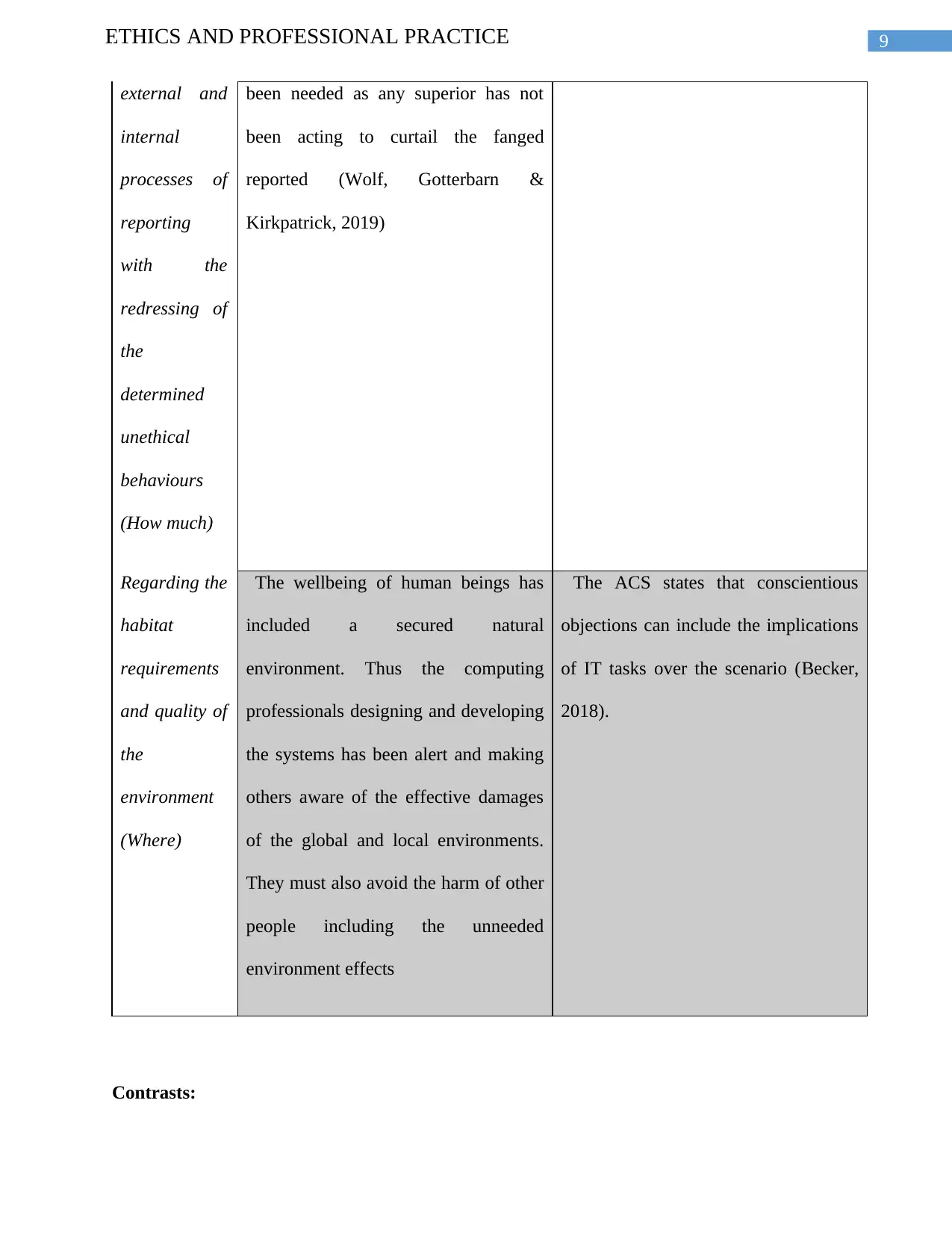
9ETHICS AND PROFESSIONAL PRACTICE
external and
internal
processes of
reporting
with the
redressing of
the
determined
unethical
behaviours
(How much)
been needed as any superior has not
been acting to curtail the fanged
reported (Wolf, Gotterbarn &
Kirkpatrick, 2019)
Regarding the
habitat
requirements
and quality of
the
environment
(Where)
The wellbeing of human beings has
included a secured natural
environment. Thus the computing
professionals designing and developing
the systems has been alert and making
others aware of the effective damages
of the global and local environments.
They must also avoid the harm of other
people including the unneeded
environment effects
The ACS states that conscientious
objections can include the implications
of IT tasks over the scenario (Becker,
2018).
Contrasts:
external and
internal
processes of
reporting
with the
redressing of
the
determined
unethical
behaviours
(How much)
been needed as any superior has not
been acting to curtail the fanged
reported (Wolf, Gotterbarn &
Kirkpatrick, 2019)
Regarding the
habitat
requirements
and quality of
the
environment
(Where)
The wellbeing of human beings has
included a secured natural
environment. Thus the computing
professionals designing and developing
the systems has been alert and making
others aware of the effective damages
of the global and local environments.
They must also avoid the harm of other
people including the unneeded
environment effects
The ACS states that conscientious
objections can include the implications
of IT tasks over the scenario (Becker,
2018).
Contrasts:
Secure Best Marks with AI Grader
Need help grading? Try our AI Grader for instant feedback on your assignments.
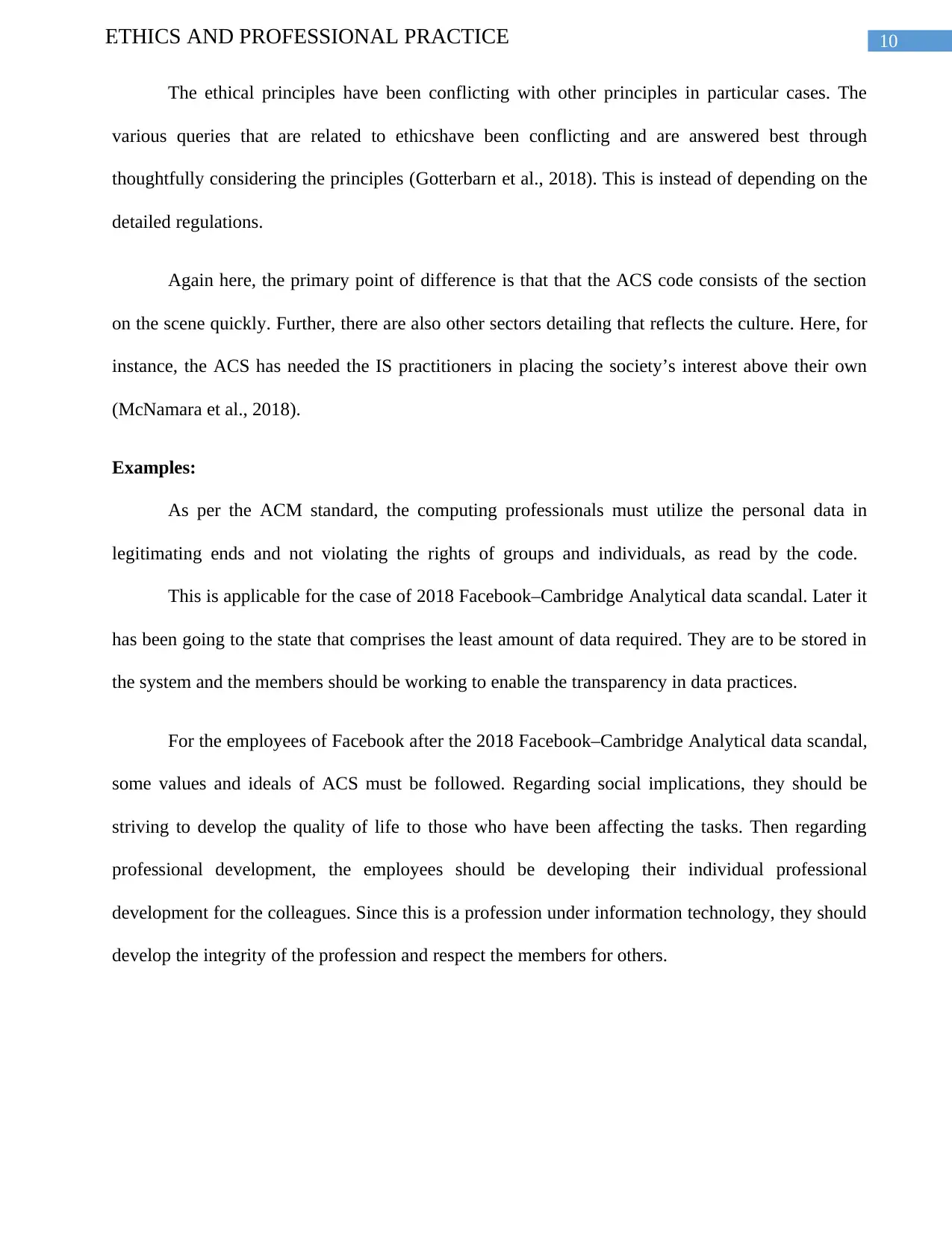
10ETHICS AND PROFESSIONAL PRACTICE
The ethical principles have been conflicting with other principles in particular cases. The
various queries that are related to ethicshave been conflicting and are answered best through
thoughtfully considering the principles (Gotterbarn et al., 2018). This is instead of depending on the
detailed regulations.
Again here, the primary point of difference is that that the ACS code consists of the section
on the scene quickly. Further, there are also other sectors detailing that reflects the culture. Here, for
instance, the ACS has needed the IS practitioners in placing the society’s interest above their own
(McNamara et al., 2018).
Examples:
As per the ACM standard, the computing professionals must utilize the personal data in
legitimating ends and not violating the rights of groups and individuals, as read by the code.
This is applicable for the case of 2018 Facebook–Cambridge Analytical data scandal. Later it
has been going to the state that comprises the least amount of data required. They are to be stored in
the system and the members should be working to enable the transparency in data practices.
For the employees of Facebook after the 2018 Facebook–Cambridge Analytical data scandal,
some values and ideals of ACS must be followed. Regarding social implications, they should be
striving to develop the quality of life to those who have been affecting the tasks. Then regarding
professional development, the employees should be developing their individual professional
development for the colleagues. Since this is a profession under information technology, they should
develop the integrity of the profession and respect the members for others.
The ethical principles have been conflicting with other principles in particular cases. The
various queries that are related to ethicshave been conflicting and are answered best through
thoughtfully considering the principles (Gotterbarn et al., 2018). This is instead of depending on the
detailed regulations.
Again here, the primary point of difference is that that the ACS code consists of the section
on the scene quickly. Further, there are also other sectors detailing that reflects the culture. Here, for
instance, the ACS has needed the IS practitioners in placing the society’s interest above their own
(McNamara et al., 2018).
Examples:
As per the ACM standard, the computing professionals must utilize the personal data in
legitimating ends and not violating the rights of groups and individuals, as read by the code.
This is applicable for the case of 2018 Facebook–Cambridge Analytical data scandal. Later it
has been going to the state that comprises the least amount of data required. They are to be stored in
the system and the members should be working to enable the transparency in data practices.
For the employees of Facebook after the 2018 Facebook–Cambridge Analytical data scandal,
some values and ideals of ACS must be followed. Regarding social implications, they should be
striving to develop the quality of life to those who have been affecting the tasks. Then regarding
professional development, the employees should be developing their individual professional
development for the colleagues. Since this is a profession under information technology, they should
develop the integrity of the profession and respect the members for others.
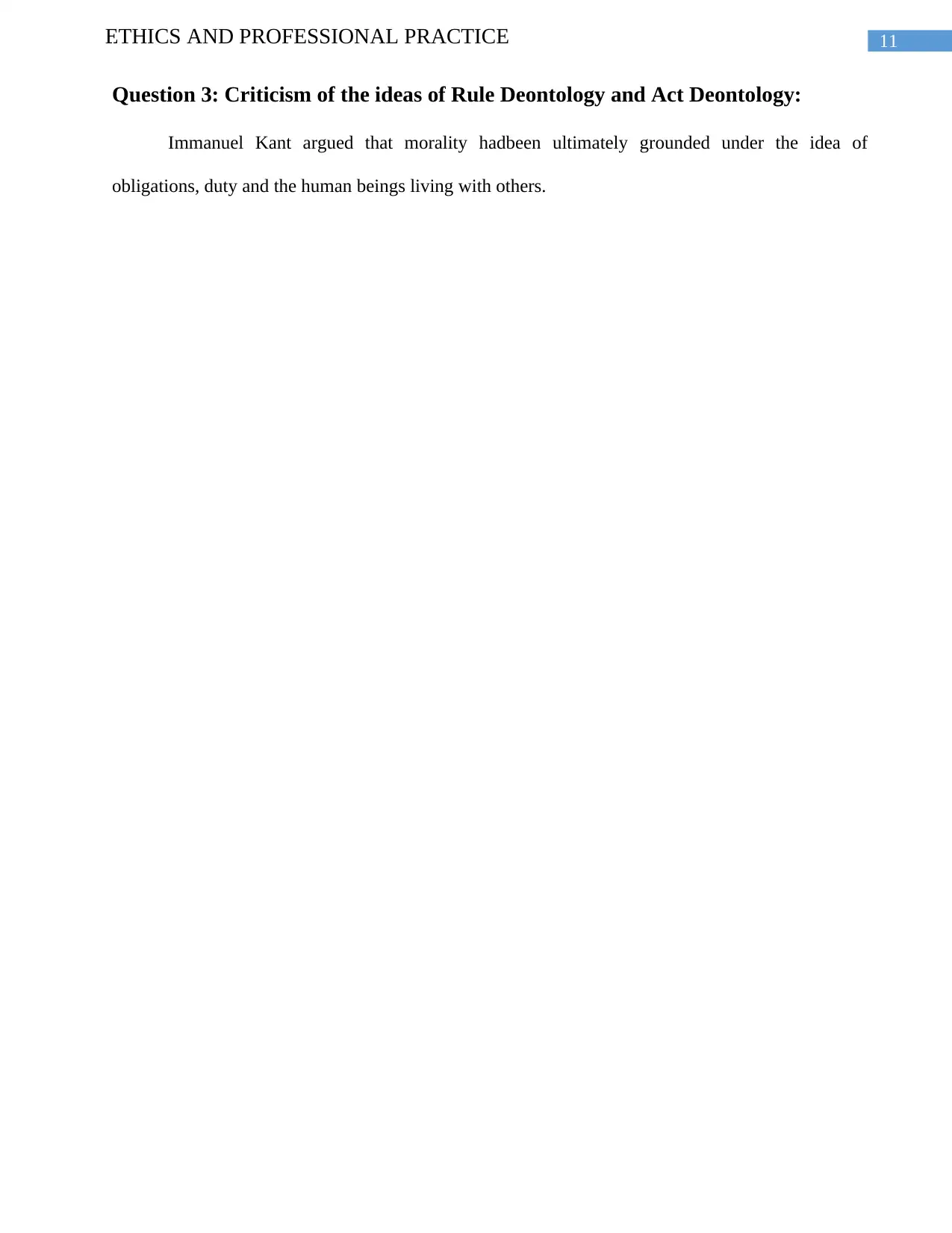
11ETHICS AND PROFESSIONAL PRACTICE
Question 3: Criticism of the ideas of Rule Deontology and Act Deontology:
Immanuel Kant argued that morality hadbeen ultimately grounded under the idea of
obligations, duty and the human beings living with others.
Question 3: Criticism of the ideas of Rule Deontology and Act Deontology:
Immanuel Kant argued that morality hadbeen ultimately grounded under the idea of
obligations, duty and the human beings living with others.
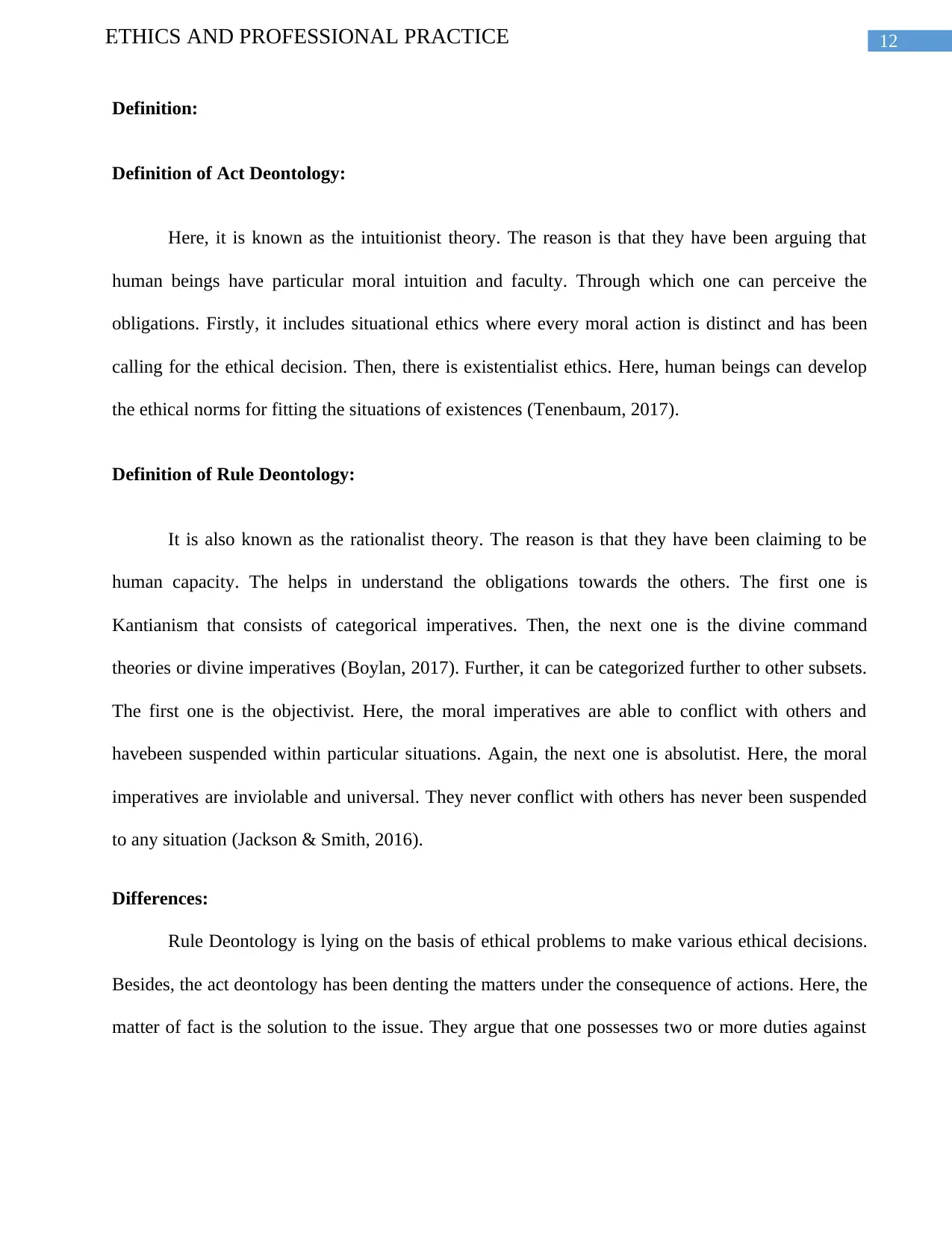
12ETHICS AND PROFESSIONAL PRACTICE
Definition:
Definition of Act Deontology:
Here, it is known as the intuitionist theory. The reason is that they have been arguing that
human beings have particular moral intuition and faculty. Through which one can perceive the
obligations. Firstly, it includes situational ethics where every moral action is distinct and has been
calling for the ethical decision. Then, there is existentialist ethics. Here, human beings can develop
the ethical norms for fitting the situations of existences (Tenenbaum, 2017).
Definition of Rule Deontology:
It is also known as the rationalist theory. The reason is that they have been claiming to be
human capacity. The helps in understand the obligations towards the others. The first one is
Kantianism that consists of categorical imperatives. Then, the next one is the divine command
theories or divine imperatives (Boylan, 2017). Further, it can be categorized further to other subsets.
The first one is the objectivist. Here, the moral imperatives are able to conflict with others and
havebeen suspended within particular situations. Again, the next one is absolutist. Here, the moral
imperatives are inviolable and universal. They never conflict with others has never been suspended
to any situation (Jackson & Smith, 2016).
Differences:
Rule Deontology is lying on the basis of ethical problems to make various ethical decisions.
Besides, the act deontology has been denting the matters under the consequence of actions. Here, the
matter of fact is the solution to the issue. They argue that one possesses two or more duties against
Definition:
Definition of Act Deontology:
Here, it is known as the intuitionist theory. The reason is that they have been arguing that
human beings have particular moral intuition and faculty. Through which one can perceive the
obligations. Firstly, it includes situational ethics where every moral action is distinct and has been
calling for the ethical decision. Then, there is existentialist ethics. Here, human beings can develop
the ethical norms for fitting the situations of existences (Tenenbaum, 2017).
Definition of Rule Deontology:
It is also known as the rationalist theory. The reason is that they have been claiming to be
human capacity. The helps in understand the obligations towards the others. The first one is
Kantianism that consists of categorical imperatives. Then, the next one is the divine command
theories or divine imperatives (Boylan, 2017). Further, it can be categorized further to other subsets.
The first one is the objectivist. Here, the moral imperatives are able to conflict with others and
havebeen suspended within particular situations. Again, the next one is absolutist. Here, the moral
imperatives are inviolable and universal. They never conflict with others has never been suspended
to any situation (Jackson & Smith, 2016).
Differences:
Rule Deontology is lying on the basis of ethical problems to make various ethical decisions.
Besides, the act deontology has been denting the matters under the consequence of actions. Here, the
matter of fact is the solution to the issue. They argue that one possesses two or more duties against
Paraphrase This Document
Need a fresh take? Get an instant paraphrase of this document with our AI Paraphraser
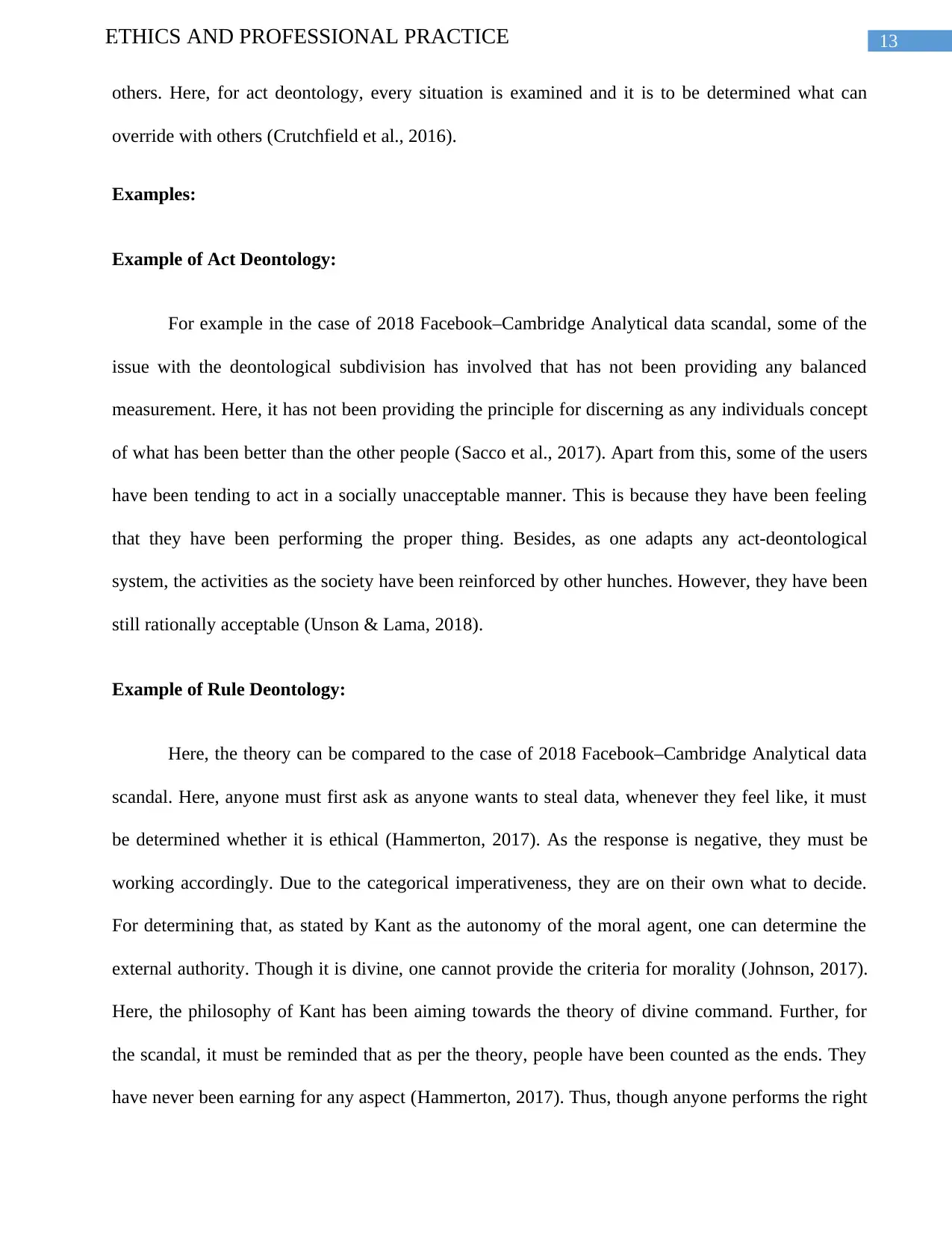
13ETHICS AND PROFESSIONAL PRACTICE
others. Here, for act deontology, every situation is examined and it is to be determined what can
override with others (Crutchfield et al., 2016).
Examples:
Example of Act Deontology:
For example in the case of 2018 Facebook–Cambridge Analytical data scandal, some of the
issue with the deontological subdivision has involved that has not been providing any balanced
measurement. Here, it has not been providing the principle for discerning as any individuals concept
of what has been better than the other people (Sacco et al., 2017). Apart from this, some of the users
have been tending to act in a socially unacceptable manner. This is because they have been feeling
that they have been performing the proper thing. Besides, as one adapts any act-deontological
system, the activities as the society have been reinforced by other hunches. However, they have been
still rationally acceptable (Unson & Lama, 2018).
Example of Rule Deontology:
Here, the theory can be compared to the case of 2018 Facebook–Cambridge Analytical data
scandal. Here, anyone must first ask as anyone wants to steal data, whenever they feel like, it must
be determined whether it is ethical (Hammerton, 2017). As the response is negative, they must be
working accordingly. Due to the categorical imperativeness, they are on their own what to decide.
For determining that, as stated by Kant as the autonomy of the moral agent, one can determine the
external authority. Though it is divine, one cannot provide the criteria for morality (Johnson, 2017).
Here, the philosophy of Kant has been aiming towards the theory of divine command. Further, for
the scandal, it must be reminded that as per the theory, people have been counted as the ends. They
have never been earning for any aspect (Hammerton, 2017). Thus, though anyone performs the right
others. Here, for act deontology, every situation is examined and it is to be determined what can
override with others (Crutchfield et al., 2016).
Examples:
Example of Act Deontology:
For example in the case of 2018 Facebook–Cambridge Analytical data scandal, some of the
issue with the deontological subdivision has involved that has not been providing any balanced
measurement. Here, it has not been providing the principle for discerning as any individuals concept
of what has been better than the other people (Sacco et al., 2017). Apart from this, some of the users
have been tending to act in a socially unacceptable manner. This is because they have been feeling
that they have been performing the proper thing. Besides, as one adapts any act-deontological
system, the activities as the society have been reinforced by other hunches. However, they have been
still rationally acceptable (Unson & Lama, 2018).
Example of Rule Deontology:
Here, the theory can be compared to the case of 2018 Facebook–Cambridge Analytical data
scandal. Here, anyone must first ask as anyone wants to steal data, whenever they feel like, it must
be determined whether it is ethical (Hammerton, 2017). As the response is negative, they must be
working accordingly. Due to the categorical imperativeness, they are on their own what to decide.
For determining that, as stated by Kant as the autonomy of the moral agent, one can determine the
external authority. Though it is divine, one cannot provide the criteria for morality (Johnson, 2017).
Here, the philosophy of Kant has been aiming towards the theory of divine command. Further, for
the scandal, it must be reminded that as per the theory, people have been counted as the ends. They
have never been earning for any aspect (Hammerton, 2017). Thus, though anyone performs the right
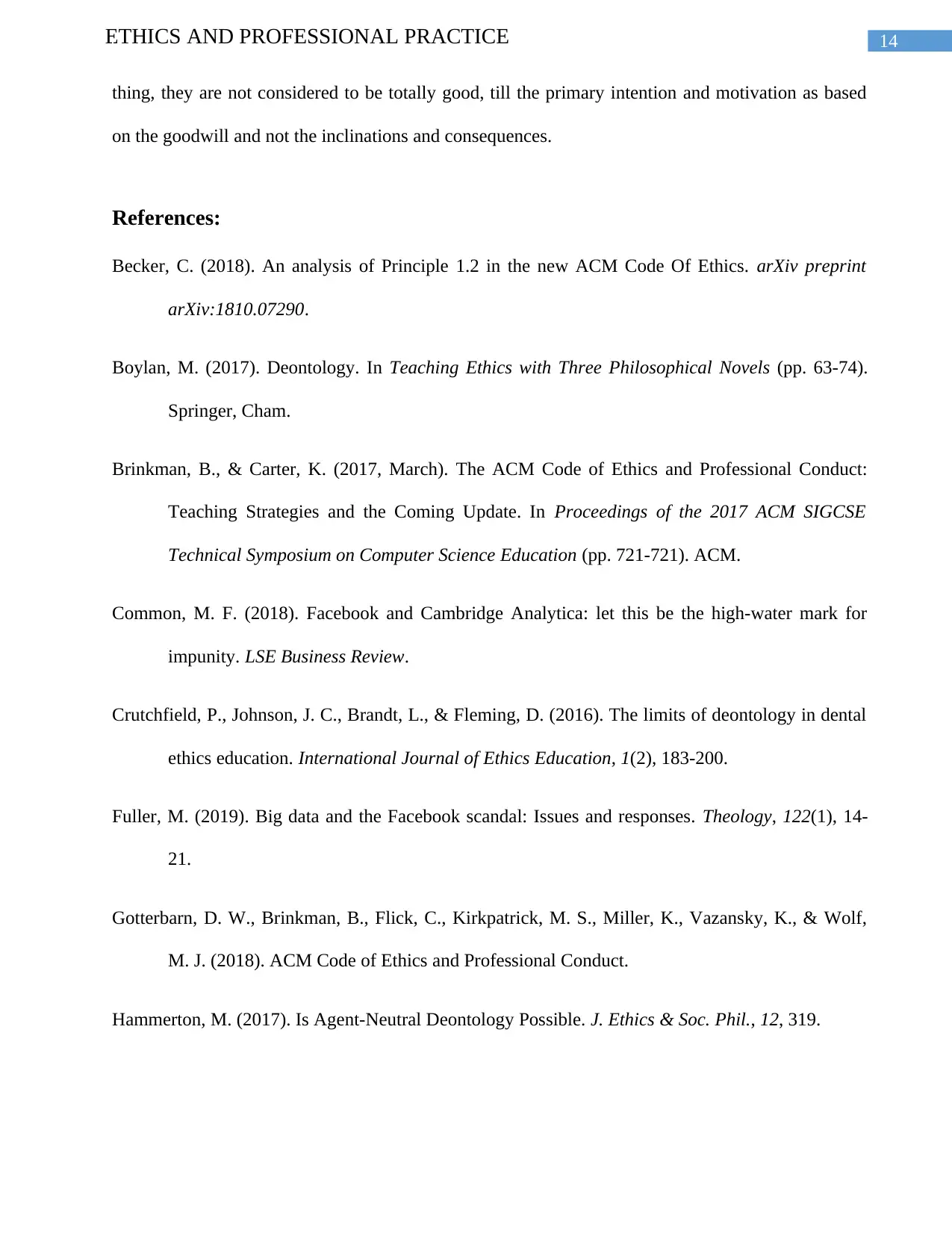
14ETHICS AND PROFESSIONAL PRACTICE
thing, they are not considered to be totally good, till the primary intention and motivation as based
on the goodwill and not the inclinations and consequences.
References:
Becker, C. (2018). An analysis of Principle 1.2 in the new ACM Code Of Ethics. arXiv preprint
arXiv:1810.07290.
Boylan, M. (2017). Deontology. In Teaching Ethics with Three Philosophical Novels (pp. 63-74).
Springer, Cham.
Brinkman, B., & Carter, K. (2017, March). The ACM Code of Ethics and Professional Conduct:
Teaching Strategies and the Coming Update. In Proceedings of the 2017 ACM SIGCSE
Technical Symposium on Computer Science Education (pp. 721-721). ACM.
Common, M. F. (2018). Facebook and Cambridge Analytica: let this be the high-water mark for
impunity. LSE Business Review.
Crutchfield, P., Johnson, J. C., Brandt, L., & Fleming, D. (2016). The limits of deontology in dental
ethics education. International Journal of Ethics Education, 1(2), 183-200.
Fuller, M. (2019). Big data and the Facebook scandal: Issues and responses. Theology, 122(1), 14-
21.
Gotterbarn, D. W., Brinkman, B., Flick, C., Kirkpatrick, M. S., Miller, K., Vazansky, K., & Wolf,
M. J. (2018). ACM Code of Ethics and Professional Conduct.
Hammerton, M. (2017). Is Agent-Neutral Deontology Possible. J. Ethics & Soc. Phil., 12, 319.
thing, they are not considered to be totally good, till the primary intention and motivation as based
on the goodwill and not the inclinations and consequences.
References:
Becker, C. (2018). An analysis of Principle 1.2 in the new ACM Code Of Ethics. arXiv preprint
arXiv:1810.07290.
Boylan, M. (2017). Deontology. In Teaching Ethics with Three Philosophical Novels (pp. 63-74).
Springer, Cham.
Brinkman, B., & Carter, K. (2017, March). The ACM Code of Ethics and Professional Conduct:
Teaching Strategies and the Coming Update. In Proceedings of the 2017 ACM SIGCSE
Technical Symposium on Computer Science Education (pp. 721-721). ACM.
Common, M. F. (2018). Facebook and Cambridge Analytica: let this be the high-water mark for
impunity. LSE Business Review.
Crutchfield, P., Johnson, J. C., Brandt, L., & Fleming, D. (2016). The limits of deontology in dental
ethics education. International Journal of Ethics Education, 1(2), 183-200.
Fuller, M. (2019). Big data and the Facebook scandal: Issues and responses. Theology, 122(1), 14-
21.
Gotterbarn, D. W., Brinkman, B., Flick, C., Kirkpatrick, M. S., Miller, K., Vazansky, K., & Wolf,
M. J. (2018). ACM Code of Ethics and Professional Conduct.
Hammerton, M. (2017). Is Agent-Neutral Deontology Possible. J. Ethics & Soc. Phil., 12, 319.
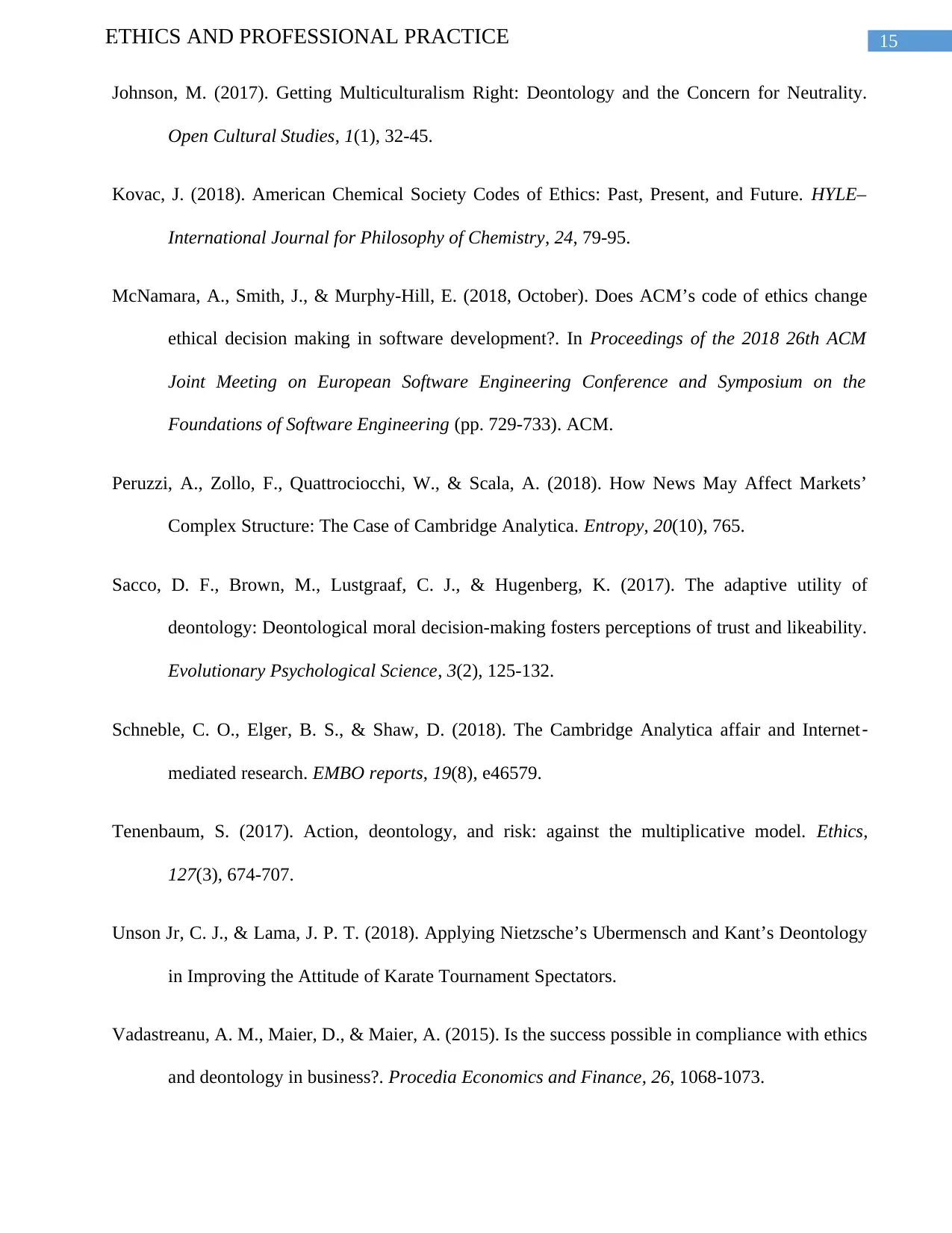
15ETHICS AND PROFESSIONAL PRACTICE
Johnson, M. (2017). Getting Multiculturalism Right: Deontology and the Concern for Neutrality.
Open Cultural Studies, 1(1), 32-45.
Kovac, J. (2018). American Chemical Society Codes of Ethics: Past, Present, and Future. HYLE–
International Journal for Philosophy of Chemistry, 24, 79-95.
McNamara, A., Smith, J., & Murphy-Hill, E. (2018, October). Does ACM’s code of ethics change
ethical decision making in software development?. In Proceedings of the 2018 26th ACM
Joint Meeting on European Software Engineering Conference and Symposium on the
Foundations of Software Engineering (pp. 729-733). ACM.
Peruzzi, A., Zollo, F., Quattrociocchi, W., & Scala, A. (2018). How News May Affect Markets’
Complex Structure: The Case of Cambridge Analytica. Entropy, 20(10), 765.
Sacco, D. F., Brown, M., Lustgraaf, C. J., & Hugenberg, K. (2017). The adaptive utility of
deontology: Deontological moral decision-making fosters perceptions of trust and likeability.
Evolutionary Psychological Science, 3(2), 125-132.
Schneble, C. O., Elger, B. S., & Shaw, D. (2018). The Cambridge Analytica affair and Internet‐
mediated research. EMBO reports, 19(8), e46579.
Tenenbaum, S. (2017). Action, deontology, and risk: against the multiplicative model. Ethics,
127(3), 674-707.
Unson Jr, C. J., & Lama, J. P. T. (2018). Applying Nietzsche’s Ubermensch and Kant’s Deontology
in Improving the Attitude of Karate Tournament Spectators.
Vadastreanu, A. M., Maier, D., & Maier, A. (2015). Is the success possible in compliance with ethics
and deontology in business?. Procedia Economics and Finance, 26, 1068-1073.
Johnson, M. (2017). Getting Multiculturalism Right: Deontology and the Concern for Neutrality.
Open Cultural Studies, 1(1), 32-45.
Kovac, J. (2018). American Chemical Society Codes of Ethics: Past, Present, and Future. HYLE–
International Journal for Philosophy of Chemistry, 24, 79-95.
McNamara, A., Smith, J., & Murphy-Hill, E. (2018, October). Does ACM’s code of ethics change
ethical decision making in software development?. In Proceedings of the 2018 26th ACM
Joint Meeting on European Software Engineering Conference and Symposium on the
Foundations of Software Engineering (pp. 729-733). ACM.
Peruzzi, A., Zollo, F., Quattrociocchi, W., & Scala, A. (2018). How News May Affect Markets’
Complex Structure: The Case of Cambridge Analytica. Entropy, 20(10), 765.
Sacco, D. F., Brown, M., Lustgraaf, C. J., & Hugenberg, K. (2017). The adaptive utility of
deontology: Deontological moral decision-making fosters perceptions of trust and likeability.
Evolutionary Psychological Science, 3(2), 125-132.
Schneble, C. O., Elger, B. S., & Shaw, D. (2018). The Cambridge Analytica affair and Internet‐
mediated research. EMBO reports, 19(8), e46579.
Tenenbaum, S. (2017). Action, deontology, and risk: against the multiplicative model. Ethics,
127(3), 674-707.
Unson Jr, C. J., & Lama, J. P. T. (2018). Applying Nietzsche’s Ubermensch and Kant’s Deontology
in Improving the Attitude of Karate Tournament Spectators.
Vadastreanu, A. M., Maier, D., & Maier, A. (2015). Is the success possible in compliance with ethics
and deontology in business?. Procedia Economics and Finance, 26, 1068-1073.
Secure Best Marks with AI Grader
Need help grading? Try our AI Grader for instant feedback on your assignments.
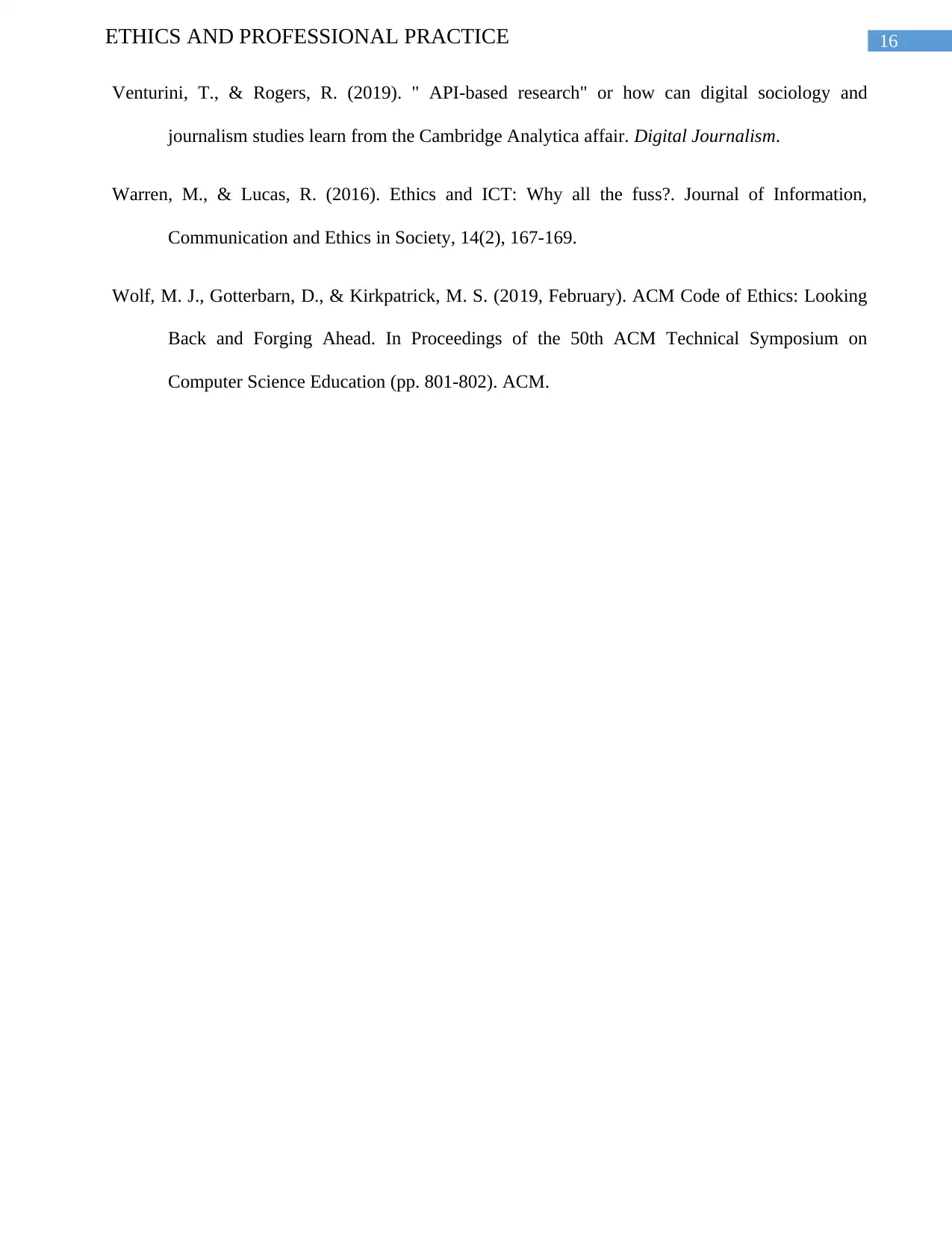
16ETHICS AND PROFESSIONAL PRACTICE
Venturini, T., & Rogers, R. (2019). " API-based research" or how can digital sociology and
journalism studies learn from the Cambridge Analytica affair. Digital Journalism.
Warren, M., & Lucas, R. (2016). Ethics and ICT: Why all the fuss?. Journal of Information,
Communication and Ethics in Society, 14(2), 167-169.
Wolf, M. J., Gotterbarn, D., & Kirkpatrick, M. S. (2019, February). ACM Code of Ethics: Looking
Back and Forging Ahead. In Proceedings of the 50th ACM Technical Symposium on
Computer Science Education (pp. 801-802). ACM.
Venturini, T., & Rogers, R. (2019). " API-based research" or how can digital sociology and
journalism studies learn from the Cambridge Analytica affair. Digital Journalism.
Warren, M., & Lucas, R. (2016). Ethics and ICT: Why all the fuss?. Journal of Information,
Communication and Ethics in Society, 14(2), 167-169.
Wolf, M. J., Gotterbarn, D., & Kirkpatrick, M. S. (2019, February). ACM Code of Ethics: Looking
Back and Forging Ahead. In Proceedings of the 50th ACM Technical Symposium on
Computer Science Education (pp. 801-802). ACM.
1 out of 17
Related Documents
Your All-in-One AI-Powered Toolkit for Academic Success.
+13062052269
info@desklib.com
Available 24*7 on WhatsApp / Email
![[object Object]](/_next/static/media/star-bottom.7253800d.svg)
Unlock your academic potential
© 2024 | Zucol Services PVT LTD | All rights reserved.





